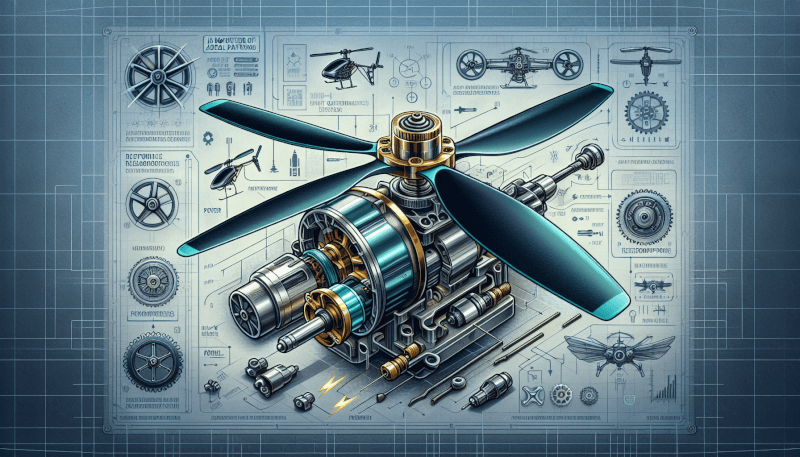In the exciting world of remote control helicopters, finding the perfect motor and propeller combo can make all the difference in your flying experience. You want your RC heli to fly smoothly and efficiently, with the perfect balance of power and control. But with so many options available, how do you choose the right motor and propeller combo for your specific needs? In this article, we will explore the factors to consider when making this important decision, from motor size and type to propeller specifications and blade size. Get ready to take your RC helicopter to new heights by selecting the perfect motor and propeller combo that meets your needs and enhances your flying skills.
Factors to Consider When Choosing a Motor and Propeller Combo
Power Requirements
When choosing a motor and propeller combo for your RC helicopter, one of the first factors to consider is the power requirements. Different helicopters have different power demands based on their size, weight, and desired performance. It’s important to choose a motor and propeller combo that can deliver enough power to meet these requirements. If the motor is underpowered, the helicopter will struggle to lift off and perform maneuvers, whereas an overpowered motor can lead to instability and potential damage.
Weight and Balance
The weight and balance of your helicopter play a crucial role in its flight performance. It’s essential to select a motor and propeller combo that is suitable for the weight of your helicopter. If the motor is too heavy or the propeller too large, it can negatively impact the balance, making the helicopter difficult to control. On the other hand, if the motor and propeller are too light, the helicopter may lack the necessary lift and responsiveness. Finding the right balance is key to ensuring optimal flight characteristics.
Experience Level
Another crucial factor to consider is your experience level as a pilot. If you’re a beginner, it’s advisable to choose a motor and propeller combo that is suited for entry-level pilots. These combos typically offer stability and ease of control, allowing you to learn the basics of flight without feeling overwhelmed. As you gain more experience and confidence, you can opt for more powerful and advanced motor and propeller combinations, which offer greater speed and maneuverability.
Flight Time
Flight time is an important consideration for all pilots, regardless of their experience level. The motor and propeller combo you choose should be efficient enough to provide a satisfactory flight time. Factors such as battery capacity, motor efficiency, and propeller design can all impact the duration of your flight. It’s essential to consider the flight time you desire and select a motor and propeller combo that can meet that requirement. Keep in mind that more powerful motors typically consume more battery power, reducing the overall flight time.
Budget
Lastly, your budget is a practical consideration when choosing a motor and propeller combo. These components can vary significantly in price, depending on their quality, performance, and brand. It’s important to strike a balance between your desired performance and your budgetary constraints. There are options available for every budget range, so you can find a suitable motor and propeller combo without breaking the bank. However, it’s crucial to consider the quality and reliability of the components to ensure a safe and enjoyable flying experience.
Understanding the Different Types of Motors
When it comes to motors for RC helicopters, there are two main types to consider: brushed motors and brushless motors.
Brushed Motors
Brushed motors are the traditional type of motor commonly used in RC helicopters. They consist of a rotor with brushes that make contact with a commutator, creating electromechanical energy. While brushed motors are generally less expensive, they tend to be less efficient and have a shorter lifespan compared to brushless motors. However, they can still be a suitable choice for beginners or those on a budget.
Brushless Motors
Brushless motors are a more advanced type of motor that has become increasingly popular in RC helicopters. These motors use a permanent magnet rotor and electronically controlled stator windings. Brushless motors offer numerous advantages, including higher efficiency, longer lifespan, and greater power output. They are generally more expensive than brushed motors but provide superior performance and reliability, making them a preferred choice for intermediate and advanced pilots.

Understanding the Different Types of Propellers
When selecting a propeller for your RC helicopter, it’s important to consider various factors that can affect performance and flight characteristics.
Size and Pitch
One of the key aspects of propeller selection is the size and pitch. The size refers to the diameter of the propeller, while the pitch indicates the distance the propeller would theoretically travel forward in one revolution. Larger propellers generally produce more thrust, while propellers with higher pitch can generate higher speeds. It’s crucial to choose a propeller size and pitch that match the motor’s capabilities and the helicopter’s power requirements.
Material
Propellers are commonly made from materials such as plastic, carbon fiber, or wood. Each material has its unique characteristics and performance attributes. Plastic propellers are lightweight and cost-effective, making them a popular choice for beginners. Carbon fiber propellers are stronger, stiffer, and more durable, offering increased performance for advanced pilots. Wood propellers, while less common, can provide unique flight characteristics and a classic aesthetic appeal.
Number of Blades
Propellers can have different numbers of blades, typically ranging from two to six. The number of blades directly affects the thrust generated by the propeller. Two-bladed propellers are the most common and provide a balanced combination of lift and efficiency. However, four-bladed propellers can improve stability and control, while six-bladed propellers are often used for specialized applications. The choice of the number of blades depends on the desired flight characteristics and the specific requirements of your RC helicopter.
Matching Motor and Propeller Combo
Once you have a good understanding of the different types of motors and propellers, it’s crucial to match them appropriately to achieve optimal performance.
Motor Kv Rating and Propeller Size
The Kv rating of a motor is a measure of how many RPMs the motor will turn per volt. It’s essential to select a motor with an appropriate Kv rating that can accommodate the propeller size and desired performance. Smaller propellers typically require higher Kv ratings, while larger propellers can work well with lower Kv ratings. Matching the motor Kv rating with the propeller size ensures efficient power delivery and helps prevent motor overheating or damage.
Motor Power and Propeller Pitch
The power output of the motor and the pitch of the propeller also need to be matched correctly. Higher power motors can handle propellers with higher pitch, resulting in increased speed and performance. On the other hand, lower power motors are better suited for propellers with lower pitch, offering better low-end torque and control. It’s crucial to find the right balance between motor power and propeller pitch to achieve the desired flight characteristics.
Efficiency and Flight Performance
Efficiency is a vital factor when choosing a motor and propeller combo. Efficient combinations minimize energy losses and maximize flight time, making the most of the available power source. A well-matched motor and propeller combo will provide optimal efficiency, resulting in smooth, stable flight performance. It’s vital to consider factors such as motor and propeller design, weight, and balance to ensure the most efficient operation of your RC helicopter.

Choosing the Right Motor and Propeller Combo for Beginner Pilots
For beginner pilots, it’s essential to select a motor and propeller combo that offers stability and ease of control.
Recommended Motor and Propeller Combos
There are several motor and propeller combos recommended for beginner pilots. These combos usually consist of lower Kv rating brushless motors and smaller propellers. The lower Kv rating provides better low-end torque, allowing for smoother and more controlled flight. The smaller propellers offer sufficient lift without overwhelming the helicopter’s stability. These combos strike a balance between performance and manageability, making them ideal for pilots who are just starting.
Flight Stability and Control
Flight stability and control are crucial for beginner pilots to build confidence and skills. The right motor and propeller combo should provide stable flight characteristics, allowing pilots to learn and practice basic maneuvers with ease. Additionally, the combo should offer responsive control, ensuring smooth and accurate movements. By choosing the appropriate motor and propeller combo, beginner pilots can enjoy a rewarding and enjoyable experience right from the start.
Choosing the Right Motor and Propeller Combo for Intermediate and Advanced Pilots
Intermediate and advanced pilots have more options and opportunities for customization when selecting a motor and propeller combo.
Higher Performance Motors and Propellers
Intermediate and advanced pilots can benefit from higher performance motors and propellers that offer increased speed, agility, and maneuverability. These combos typically feature higher Kv rating brushless motors and larger propellers. The higher Kv rating results in faster RPMs, enabling quicker acceleration and higher speeds. Larger propellers generate more thrust, providing the power needed for advanced aerobatic maneuvers. By selecting these higher performance combos, pilots can push their flying skills to the next level.
Customization and Fine-tuning
Intermediate and advanced pilots often enjoy fine-tuning their RC helicopters to suit their specific flying preferences. They can experiment with different motor and propeller combinations to find the optimal balance between power, agility, and flight characteristics. These pilots may also choose to modify their helicopters by adjusting the pitch angles of the blades or adding specialized components. The ability to customize and fine-tune the motor and propeller combo gives intermediate and advanced pilots the flexibility to achieve their desired flight performance.

Maintenance and Upgrades
To ensure the longevity and optimal performance of your motor and propeller combo, regular maintenance and occasional upgrades are necessary.
Regular Maintenance
Regular maintenance is essential to keep your motor and propeller combo in top condition. This includes checking for any damage or wear and tear after each flight, cleaning the components, and ensuring proper lubrication. It’s also important to inspect the propeller blades for any signs of deformation or imbalance. Regular maintenance not only prolongs the lifespan of your components but also ensures safe and reliable operation during each flight.
Upgrading to Higher Performance Motors and Propellers
As you progress in your flying skills and desire more advanced performance, you may consider upgrading to higher performance motors and propellers. These upgrades can provide increased speed, power, and maneuverability, enhancing your flying experience. However, it’s essential to ensure that your helicopter’s frame, electronic speed controller (ESC), and battery can handle the upgraded components. Consulting with experienced pilots or seeking professional advice can help you make informed decisions when upgrading your motor and propeller combo.
Conclusion
Choosing the right motor and propeller combo for your RC helicopter is crucial for achieving optimal performance and a satisfying flying experience. Factors such as power requirements, weight and balance, experience level, flight time, and budget should all be carefully considered. Understanding the different types of motors and propellers, as well as how they affect flight characteristics, is essential for making informed decisions. Whether you’re a beginner, intermediate, or advanced pilot, there are motor and propeller combos available to suit your specific needs and preferences. Regular maintenance and occasional upgrades will help ensure the longevity and optimal performance of your components. With the right motor and propeller combo, you can soar through the skies and enjoy the excitement of RC heli flying to the fullest.



